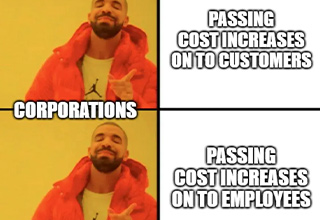Where the Music Industry is headed
Michael Arrington of TechCrunch sums up nicely the issues that are facing the music industry, and Readwriteweb echoes some of the same sentiments. Basically, sales of CDs and digital downloads are not going to make huge amounts of money for anyone going forward. Both argue that the real money will be made from ticket sales for live performances, merchandising, and special limited-edition physical copies of the music.
But there is money being made from digital downloads - it’s just not of the scale that the major record labels are used to. In 2007, there were 844.2 million digital tracks sold. Radiohead’s recent experiment, in which the band released an album online for free download and asked listeners to pay what they wanted, made them more money from the digital distribution then they made from the digital distribution of all the rest of their albums combined. If this seems strange, there is a simple reason - Radiohead was released from their contract with their record label, a contract that in the past excluded them from any royalties from the digital distribution of their music (remind anyone of the current writer’s strike?) Many signed bands and musicians are currently stuck in contracts like these, the relics of an era when digital distribution didn’t really matter.
Of course, there is still money being made in the music industry, but as fewer people are buying CDs (that are costly to produce and distribute) and as more people are downloading digital music (that is practically free to reproduce and distribute), less money is being made. And, the money is being spread among more musicians. The Long Tail is in full force in the music industry, allowing more people to make money as consumers spend their dollars on a wider variety of music and musicians.
So this puts the music industry in this strange position. The indie artists, who are making some money on their small but loyal audiences and the Long Tail, but often not enough money to live off of, would be psyched to get a record contract because the record companies have the marketing and distribution capabilities that they don’t have access to. The big (and already famous) bands, are trying to get out of their contracts in favor of the freedom that the indie artists enjoy. And the record companies are panicking. This is creating a weird, wild situation where everything is about to totally implode if change doesn’t happen quickly.
The really big question is: What online business model is going to work for the music industry going forward? Any successful model will have to support both the record labels and the artists who are producing music. And it will have to be one that consumers will spend their money on.
Here are my predictions:
1. The new model will be all about the audience:
In the past, bands knew how many records or songs they sold, but not the name of the individual that bought them. Digital download and distribution, as well as social networking sites like MySpace, now let musicians know much more intimately who their audience is. By collecting the name of the individual who downloads their song (whether they pay for it or get the download for free), musicians will be able to have a much more personal relationship with their audience - and they will be able to re-market to them in the future. As musicians begin to realize that having the name of their fan is worth more money than the $0.70 they get from iTunes, they will either begin offering all their songs for free, or Apple will have to adjust their business model and begin sharing data with the artists. Radiohead may have been the first major label to try offering free downloads, but many others are following suit. Trent Reznor (of Nine Inch Nails fame), just produced a Saul Williams album and released it online the same way that Radiohead did - and he has told everyone about the data that they collected. Reznor is bemoaning the fact that only 18.3% of the people who downloaded the album paid $5 for it. He thinks that this stinks (and it might) but he is neglecting the really exciting fact that 154,449 people downloaded Williams’ album! That is an audience of 154,449 if you at least collected an email address. That is a significant fan base - and in my opinion, it is going to be the primary model of the future.
2. Musicians will begin releasing songs more frequently, as well as more versions of each song:
When digital downloads become the norm (and that day is close), there will be no need to stick with the CD format where musicians release all their fully produced songs in one giant lump. Instead, they’ll release things as they are done, there will be more live performance and acoustic versions of songs, and more interesting bits, more looks into the recording studios, more evidence that songwriters and musicians are humans and that every version that they play isn’t perfect. (UPDATE: Looks likeMark Cuban agrees with this prediction.)
3. Record labels will try to hold on to their business models:
They will succeed only until current contracts run out, but they will eventually fail. They will do this not because they don’t see the writing on the wall, but because they can’t figure out how to change.
4. A new type of record label will emerge:
The new label will serve more as a helper to the artist than an owner of the artist. This new label will assist with marketing, bookings, networking and the other promotional aspects of the music business. But instead of owning all the rights to the artist, musicians will PAY their labels for their help, and the musicians will retain their rights. The new labels that will be successful will be the ones that know how to do SEO, online marketing and social networking. These types of labels will become the norm. (And they probably wont’ be called record labels.) (UPDATE: Looks like CNET agrees with this prediction: “If we end up ridding the world of labels, we’ll only have to re-create them–in some other, probably more nimble form.”)
5. Apple will be one of the new "record labels."
6. Many new online and digital services will rise and fall:
In 2-3 years, we’ll be left with the winners. At least three of the winners will be companies that no one has even heard of yet.
7. There will be new ways to buy music:
Walking through Target, no longer will you head to the music section to buy music. Instead, as you hear a song piped over the airways, or walk past a TV that is playing a music video and decide you like the song, you will be able to use your phone or mp3 player to purchase and and download the song instantly.
8. The stuff inside the CD case will still be valuable in digital format, but will look completely different:
People still buy CDs for the lyrics and the liner notes inside - as well as for the artwork and the experience of opening the case and looking through the packaging. This won’t change, there will always be a market (although a smaller one) for the special edition hardcopy CDs. And it won’t be long until someone comes up with a way to sell that stuff in digital format, as well. But although the digital information will be the same, it won’t look the same as the CDs of today. This will be a huge money-maker, much bigger than anyone expects.





5 Comments